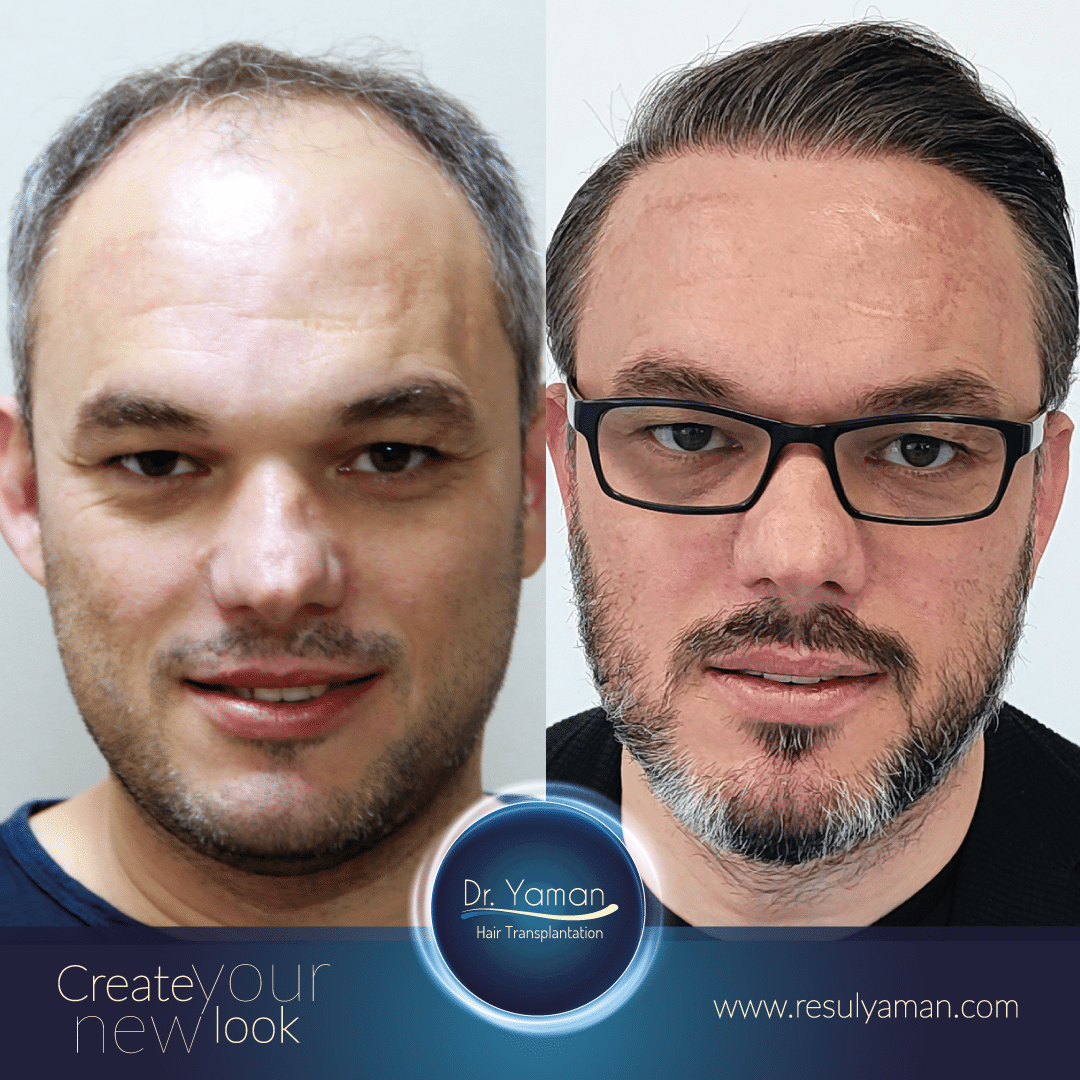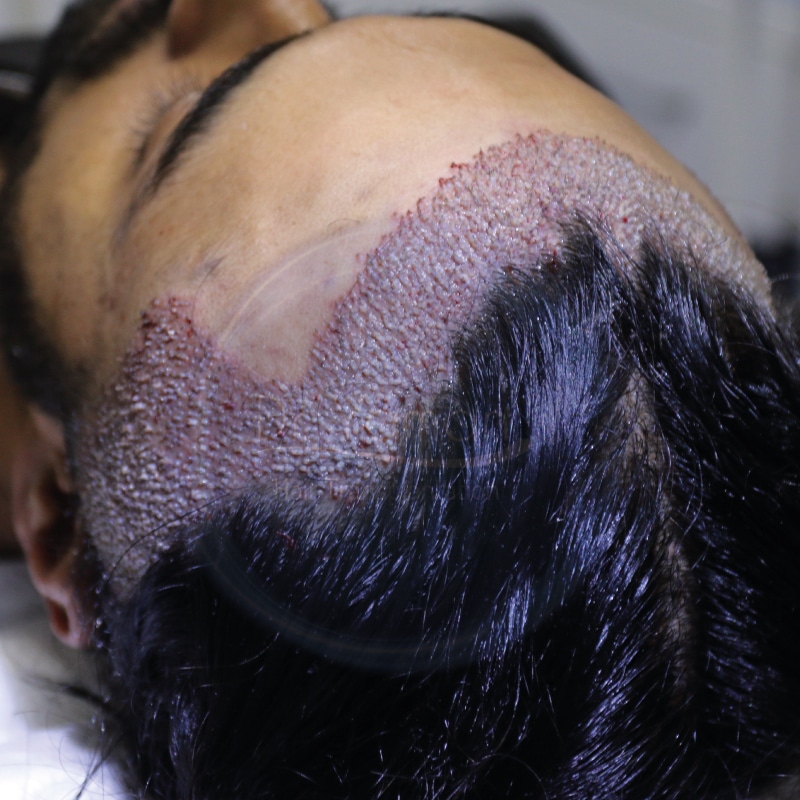The recovery period of FUE hair transplants is thankfully short and in normal circumstances you can expect to be back at work within 7 days (if you work face to face with others) or as little as 2-3 days if you work from home.
Regardless, you still need to be disciplined and take your recovery seriously. While FUE surgeries have a high success rate of 90%+, there are specific products and medications to avoid during the recovery period that you must be aware of – we discuss them below.
1. Shampoo (Up to 48 hours after)
After an FUE surgery it is standard practice to not wash your hair for 48 hours after the procedure. This might seem dirty but it’s essential as the transplanted hair follicles are incredibly fragile and sensitive at this stage.
Even after 48 hours you can only wash your hair gently and shouldn’t blast water directly onto your scalp. Instead, it’s better and safer to simply pour water over your head with a cup or container and massage the shampoo and conditioner into your hair slowly.
2. Hair Dye (Up to four weeks after)
Hair dye contains strong chemicals that compromise the quality and health of your newly transplanted hair follicles. If you dye your hair after a transplant then you risk damaging the fragile follicles and invalidating the entire procedure.
The best advice is to not dye your hair for up to a month after your surgery. Even then, we still advise speaking to your surgeon and seeking professional advice as to whether it is wise to dye your hair or not.
3. Ice (For the duration)
This might seem like a strange one, but patients who undergo FUE hair transplant in Turkey must refrain from placing ice directly on their scalp. There is the temptation to do this to reduce swelling and help soothe any soreness you have after the procedure. Ice can contract blood vessels on your scalp and slow down your recovery process.
4. Alcohol (For the duration)
In general terms for your health, regular and excessive alcohol consumption isn’t beneficial. We all know the associated side effects and the detriments it can have to your cognitive abilities, decision-making, and health.
However, alcohol after a hair transplant can also cause damage. Firstly, it can increase your recovery period which is something no one wants.
Secondly, alcohol is known to raise blood pressure and this means that blood flow and the movement of essential nutrients to your scalp and transplanted hair follicles is disrupted.
Ideally, you should avoid drinking any alcohol for at least five days after your surgery. But it could be a good lifestyle change to keep this up for longer!
Also Read: Are There Any Non-Surgical Alternatives to Hair Transplant?
5. Tobacco / Smoking (For the duration)
It is advised that you actually try and quit smoking several months BEFORE your hair transplant surgery. We get that this is incredibly difficult but it can reap benefits and improve the chances of your hair transplant being successful.
Smoking, like alcohol, raises your blood pressure which can affect the blood supply to your scalp and new hair follicles.
Anything like cigarettes, cigars, e-cigs, and nicotine patches should be avoided for at least a month after your hair transplant. As with alcohol, now could be the perfect time to cut this habit out completely and start a new healthier lifestyle.
6. Fast Foods (For the duration)
We completely understand that fast food offers an easy alternative and is incredibly convenient when you simply don’t have the energy or time to prepare a proper meal.
After your surgery you may be short on time or for a few days after you may feel a little lethargic. This could lead to a craving for fast food or ordering a take away because you don’t feel up to cooking.
Please try and refrain from this and make sure that you have proper, healthy meals during your recovery. Fast food meals are often low in terms of their nutritional value and your transplanted hair follicles need all the nutrients and vitamins they can get to encourage growth and keep them stable.
7. Food and Drink High in Sugar (For the duration)
Your transplanted hair needs a strong blood supply, and plenty of the right nutrients to stimulate growth and keep healthy.
Having a high-sugar diet can affect this and it can also lead to blood sugar problems. Therefore, you need to be disciplined and refrain from eating or drinking items with a high sugar content.
This includes soda, processed juice, sweets, and chocolate. These items have a high sugar content which can affect your blood sugar, but they lack nutrient content which doesn’t promote hair growth in your newly transplanted follicles.
This doesn’t mean that you can’t have sugary foods and drinks ever again – it just means you need to be careful and not over indulge.
Read More: How Long Does it Take to See Results After a Hair Transplant?
Hair Transplant Recovery Takes Discipline and Care – Don’t Waste Your Opportunity
The success and longevity of your hair transplant is entirely in your hands. As you can see from the above, you have the power to keep your transplanted hair healthy and encourage growth and vitality by what you eat and how you conduct yourself.
If you are considering a hair transplant, it is vital you understand these specific products and medications to avoid during the recovery period as you will ultimately benefit and enjoy better results for your new hair.
 WhatsApp
WhatsApp Get Mail!
Get Mail!
 English
English Italiano
Italiano Español
Español Türkçe
Türkçe Português
Português Français
Français Deutsch
Deutsch عربي
عربي






